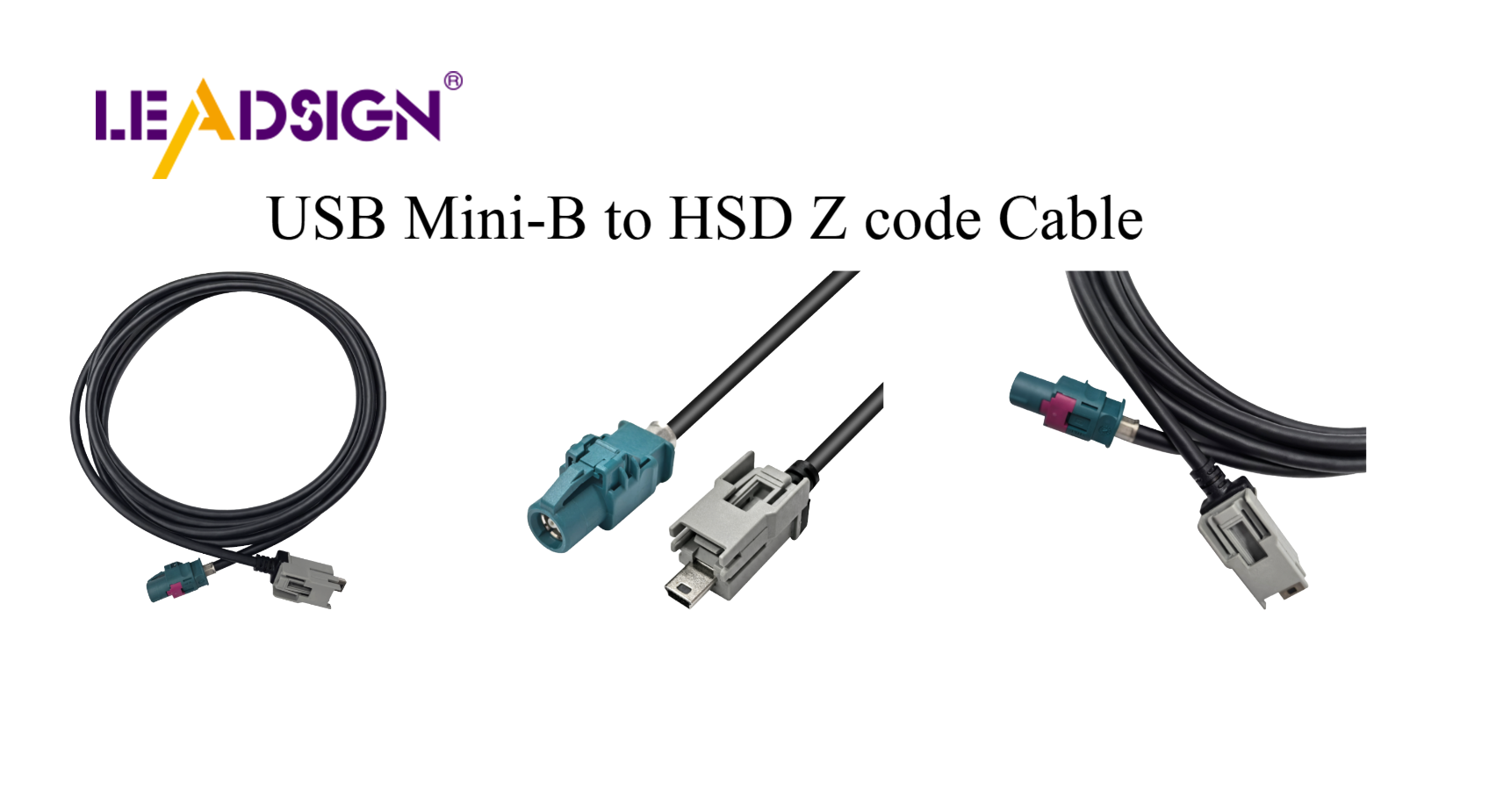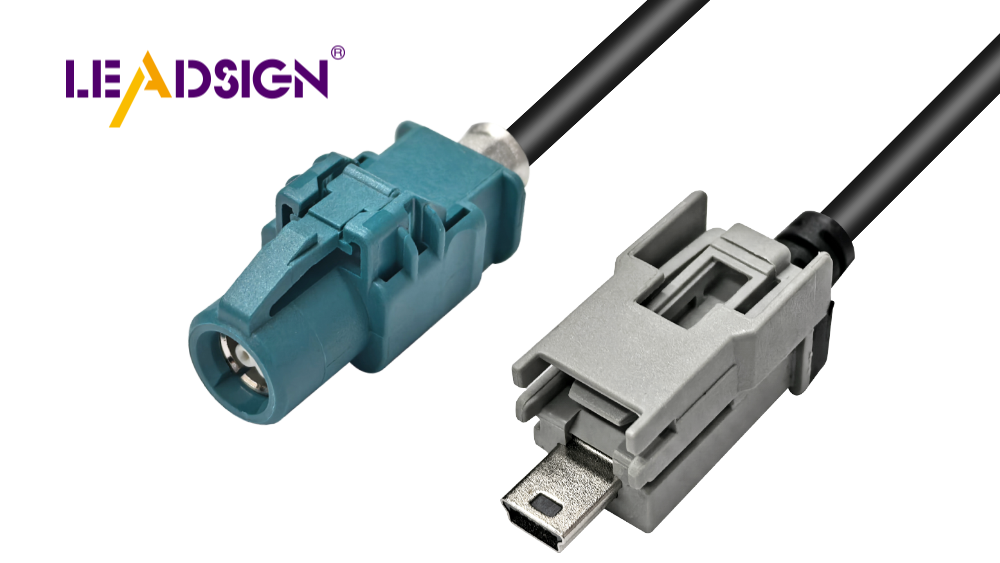Top Tips for Selecting Reliable Vehicle Connectors

Vehicle connectors are important for keeping your car safe and working well. These small parts help systems in your vehicle communicate and share power easily. Picking the wrong connectors can cause big problems like power failures, reduced efficiency, or costly repairs. As more cars become electric and connected, high-quality vehicle connectors are needed more than ever. Choosing the right ones ensures your vehicle remains safe, operates better, and lasts longer.
Key Takeaways
Understand your vehicle's specific electrical needs, including current and voltage requirements, to select the right connectors.
Choose connectors that can handle both power and data to simplify installation and save space in modern vehicles.
Opt for waterproof and dustproof connectors to ensure reliability in various weather conditions and rough terrains.
Select connectors made from appropriate materials—metal for strength and power, plastic for lightweight and corrosion resistance.
Ensure connectors match your car's wiring specifications to avoid inefficiencies and potential system failures.
Buy from trusted brands with certifications to guarantee quality and performance, avoiding cheap or counterfeit options.
Stay informed about new connector technologies, like HSD connectors, to prepare your vehicle for future advancements.
Knowing What You Need
To pick vehicle connectors, first understand your needs. Each car has different requirements. The right connectors help systems work well and last longer.
Learning About Electrical Needs
Current and voltage for car systems
Check your car's electrical needs first. Each system uses specific current and voltage levels. Big parts like electric motors need connectors for high power. Smaller parts, like lights or sensors, need low-power connectors. Using the right connector stops overheating and damage.
Power vs. data connectors
Connectors have different jobs. Some give power, others send data. Power connectors keep energy flowing to key systems. Data connectors help features like screens or safety systems talk to each other. For example, HSD connectors send lots of data fast. They are great for things like car entertainment or self-driving tech.
Looking at Extra Features
Connectors for both power and data
Modern cars often need connectors that do two jobs. These connectors save space and make setup easier. They are helpful in small cars where space is tight. Choosing these connectors keeps wiring simple and effective.
Special connectors for advanced systems (e.g., HSD connectors for fast data)
Advanced cars need special connectors. HSD connectors send data quickly and work well in tough conditions. They are good for cameras, Wi-Fi, or fancy screens. Using these connectors makes your car more reliable and efficient.
Practical Things to Think About
When picking vehicle connectors, think about how they’ll work daily. Things like how they connect and handle tough conditions are important. These factors help connectors last longer and work better.
Ways to Connect
Easy-to-use vs. permanent connectors
There are two main types of connectors: easy-to-use and permanent ones. Easy-to-use connectors are simple. You can connect or remove them quickly without tools. They’re great for systems needing regular fixes or upgrades. Permanent connectors stay in place better. They work well in areas with lots of shaking, like engines. Loose connections in these spots can cause trouble.
For example, if a system shakes a lot, use strong connectors. Butt or bullet connectors are good choices. They stay tight even in rough conditions. Pick the right type based on where you’ll use them.
Simple to install in small spaces
Putting connectors in tight spots can be hard. Choose ones that are easy to handle and don’t need special tools. Easy-to-use connectors are helpful here. They make the job quicker. In cramped areas, pick designs that snap together fast. This saves time and effort during repairs.
Protection from the Environment
Waterproof for bad weather
Connectors must handle the weather around them. For cars in rain, snow, or heat, waterproof connectors are a must. These are made to survive tough weather without breaking. Many car connectors are small and watertight. They meet strict rules to keep working in wet or hot places.
Dustproof for rough roads
Driving on dusty or muddy roads can harm connectors. Dustproof connectors stop dirt from getting inside. This keeps your car’s systems running smoothly. Whether on sandy paths or muddy trails, these connectors help your car stay reliable.
Material and Strength
When picking vehicle connectors, think about their material and strength. The right material helps them work well and last longer.
Types of Materials
Metal connectors: Strong, good for electricity, and long-lasting
Metal connectors are strong and carry electricity well. They handle high power without getting too hot. This makes them great for engines or electric motors. They last a long time and work in tough conditions. But, they can rust in wet places, so extra care is needed.
Plastic connectors: Light, no rust, and cheaper
Plastic connectors are light and don’t rust. They are good for wet or chemical-filled areas. They cost less, so they’re good for saving money. They aren’t as strong as metal but work for small systems or when weight matters.
Fighting Rust
Coatings to stop rust and make them last
Rust can damage connectors, especially metal ones. Many metal connectors have coatings to stop rust. These coatings help them last longer. If connectors face rain, snow, or salty air, pick ones with these coatings. They keep your car working well.
Easy tips to keep connectors working
Taking care of connectors is simple. Check them often for damage or dirt. Clean them gently to keep them working. Use sprays to stop rust on metal ones. Seal connectors in harsh places to block water and dust. These steps help them last longer and work better.
Compatibility and Size

Picking the right connectors is very important. They must fit your car's setup perfectly. This avoids problems and keeps things working well.
Matching with Existing Wiring
Choosing the correct type, pins, and size
Your car's wiring needs specific connectors. They must match the type, pin count, and size. Some connectors might fit but not work safely or properly. Always check if the connector meets your car's needs. This keeps wires secure and avoids bad connections.
Avoiding wrong designs that cause problems
Wrong connectors can make your car less efficient. They might not send power or data correctly. This can cause delays or system failures. For example, a bad connector might overheat or lose signals. To prevent this, ensure the connector fits your wiring and follows standards.
Small and Space-Saving Connectors
Why smaller connectors are helpful in cars
Modern cars have little space for wires and parts. Small connectors save room and keep things neat. They also make your car lighter, which helps it run better.
Keeping small size but strong performance
Small connectors should still work well. They must handle power and data without failing. Good connectors are both small and reliable. Pick ones that are strong and efficient to keep your car running smoothly.
Planning for the Future
Thinking ahead keeps your car systems working well. By choosing trusted brands and learning about new tech, you can pick better electrical connectors for your car.
Buying from Trusted Brands
Why certifications and standards matter
Always check for certifications when buying connectors. These show the connectors are safe and work well. Brands like TE Connectivity and Eigen Engineering follow strict rules. Their products handle tough conditions without failing. Good connectors lower the chance of problems. This keeps your car safe and running smoothly. Certifications also make you feel confident in your choice.
Avoiding fake or bad-quality connectors
Fake or cheap connectors can cause big issues. They might not fit right or break easily. This can harm your car’s systems. To avoid this, buy from trusted companies. Brands like HIROSE ELECTRIC CO., Ltd and TE Connectivity make reliable products. They use advanced tools and test their connectors carefully. Picking a good supplier means your connectors last longer and work better.
Learning About New Tech
Asking experts for help with tricky systems
Modern cars have advanced systems needing special connectors. For example, screens or self-driving tech need fast data connectors. Experts can guide you to the right ones. They help ensure the connectors fit your car’s systems. Professionals also give tips on setup and care, saving you time.
Discovering new connector types (e.g., HSD connectors for fast data)
Car tech is always changing, and so are connectors. HSD connectors send data quickly and are very strong. They work well for screens, Ethernet, and safety systems. These connectors mix strength with top performance. Learning about these helps you prepare your car for the future.
By picking trusted brands and staying updated on tech, your connectors will meet today’s needs and be ready for tomorrow.
Picking the right vehicle connectors keeps your car safe and reliable. Know your car's power and data needs to choose correctly. Easy-to-install connectors and weatherproof designs work best in tough conditions. Strong materials and good care make them last longer. Make sure connectors fit your car's wiring perfectly for smooth use. Buy from trusted brands and learn about new connector technology. Choosing quality connectors ensures your car works well for a long time.
FAQ
What are vehicle connectors, and why do they matter?
Vehicle connectors are small parts that link car systems. They let power and data move between systems, keeping things working. Picking the right ones keeps your car safe and reliable.
How can I find the right connectors for my car?
Check your car's electrical needs first. Look at the power and voltage each system uses. Decide if you need connectors for power, data, or both. If unsure, read your car's manual or ask an expert.
Can one connector handle both power and data?
Yes, some connectors do both jobs. These save space and make wiring easier. They are great for cars with little room. Always check if they fit your car's needs before using them.
What should I look for in connectors for tough conditions?
Choose connectors that resist water, dust, and heat. Waterproof ones work in wet places. Dustproof ones stop dirt and are good for rough roads. Pick the right type for where you drive.
Are metal or plastic connectors better?
Both have pros. Metal ones are strong and good for high power. Plastic ones are light, don’t rust, and cost less. Pick based on your car’s needs and where they’ll be used.
How can I make connectors last longer?
Take care of them. Check for dirt, damage, or rust often. Clean them gently and use sprays to stop rust. Seal them in harsh spots to block water and dust. This helps them last longer.
What if a connector doesn’t fit my car’s wiring?
Don’t force it. Wrong connectors can cause problems or damage. Match the type, size, and pins to your car’s wiring. If unsure, ask an expert for help.
Are smaller connectors as good as bigger ones?
Yes, if they’re made well. Small connectors save space and reduce weight. Look for ones that handle power and data properly.
Where should I buy vehicle connectors?
Buy from trusted brands. Look for certifications that prove quality and safety. Avoid fake or cheap ones that might break. Good brands make connectors that last longer.
Can connectors fix a wiring harness?
Yes, connectors help fix wiring harnesses. They reconnect wires and make systems work again. Use connectors that match the harness for the best results.
See Also
Why FAKRA Connectors Are Essential for Automotive Systems
Exploring Benefits of Mini FAKRA Connectors in Vehicles
Enhancing Automotive Performance with HFM Connectors

